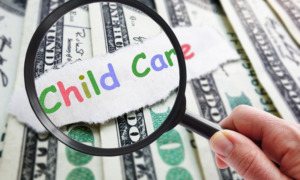Young people have a wide range of political views. It is important to create an atmosphere where they can express and explore their opinions without fear of being silenced or harassed. It is particularly important, especially since Sept. 11, to ensure that young people with minority viewpoints or from “unpopular” subgroups feel safe in youth programs.
Teenage Cassandra
By Stephanie Grob, 15
Maybe you’ve heard this joke before. A man is talking with another man, discussing the war. One of them says that he’s a pacifist, so the other man pushes him into the street. When the “pacifist” (the joke teller uses hand-gestured quotation marks at this point) tries to push back, the man says, “Oh, I thought you were a pacifist.”
Here’s the surprising part: A teacher told this joke to my class after I’d mentioned I was a pacifist. Adults tend to think that the political arena is a grown-ups’ playground; I’m not so sure. Since Sept. 11, I’ve observed my fellow teenagers actively participating in political discussions. What I have not seen, however, is much dissent. No voiced opposition to our new war on terrorism. No disapproval of the president’s foreign policy.
Granted, my sophomore class consists of only about 25 kids. But the lack of debate is reminiscent of a McCarthy-era high school (an era that we once studied in this very same school).
Some of my classmates wrap themselves in the beloved red, white and blue. A small minority just want to kill some Arabs. A few honestly don’t care about the goings-on of the world, and still others refrain from speaking up because they don’t believe their words make a difference. And then there’s me.
I am 15. I have lived in conservative, wealthy Irvine, Calif., for as long as I can remember. My parents and I are really the only liberals I know of around here. In 1996, I was the only fourth-grader (or student, for that matter) to vote for Ralph Nader in my elementary school’s mock election.
I have been asked repeatedly about the meaning of my “Stop the Drug War” key chain. I have been called a “Taliban lover” by a classmate, and a communist by a family member. As a character in the movie “That Thing You Do” remarks, “I guess I’m alone in my principles.”
My principles: I believe that our new war is not justified, because retaliation is never a suitable response to a national crisis. As Gandhi once said, “An eye for an eye leaves the whole world blind.” I am a political progressive, and I believe in equality for all beings. And finally, in concordance with Mark Twain, “The citizen who sees his society’s democratic clothes being worn out and does not cry it out is not a patriot, but a traitor.”
I see our democratic clothes being worn out every day in the classroom. An assignment in October required us to bring in a picture of a hero and a picture of a monster. As an example of a monster, I brought in the infamous photograph of Gen. Loan Ngoc Nguyen, the South Vietnamese officer who was caught on camera in 1968 in the middle of his public, spontaneous execution of an alleged Viet Cong prisoner.
In response, a few days later, my teacher brought in an article from the Los Angeles Times’ opinion section written by James Zumwalt, a retired Marine colonel, who glorified Nguyen for ridding the world of such a dangerous terrorist. Zumwalt also likened the man Nguyen executed to Osama bin Laden himself. After the teacher read the article to the class, one of the kids stated matter-of-factly, “So the general guy is really the hero, then.”
I had expected to explain my views about the photo to the rest of the class, but the class’s response to my teacher’s persuasive article, as well as my soft-spoken nature, prevented any rebuttal on my part. Discussion ensued, and before I knew it, the bell was ringing and class was over.
I was horrified. I left with the feeling that I looked a complete idiot in front of my fellow students. I was convinced they walked away thinking that I was in league with al Qaeda.
My grades have not been affected; I have not been sent home from school. Instead, I experience the more subtle ways dissent gets shut down in the classroom: by humiliation and name calling. What’s worse, however, is the fact that I, a progressive-minded teenager, am not heard as an equal.
Conservative adults regard what I say as garbage, too ridiculous to be taken seriously; they tell me it is un-American. I’ve been told numerous times by my grandpa that a 15-year-old cannot possibly know more than an old man who has lived through every war from World War II to the Gulf War.
But I’m old enough to know that freedom of speech is essential to democracy, and it’s been branded into my skull through years of history classes that we do live in a democracy. I exercise my right as an American and as a citizen to express these views, and no one – no student, no teacher, no adult – can dissuade me.
The world’s a mess and, according to Mark Twain, if we don’t say something about it, then we are indeed traitors to mankind.
© 2002, LA Weekly. www.Laweekly.com.
Walking While Arab
By Sara Said, 15
As a devout Muslim, I wear a scarf that covers my hair and neck. After the Sept. 11 attacks, I became an object of attention. Walking to school in Brooklyn about a week-and-a-half after 9-11, a man in his 30s or 40s riding his bike saw me and yelled, “I will kill all Arabs and I will show you!”
He yelled so hard I thought my eardrums would break. I felt like bursting into tears and running home. If he hadn’t kept riding past, I would’ve been running like crazy. But when strangers heard and saw the man screaming those terrifying words, they asked me, “Are you OK?” or said, “Just ignore him.” Some smiled and tried to make me feel safe, which helped a little.
At school, I felt that my mind was somewhere else. The man’s screaming kept bothering me when I was in class. I was shaken, but I wasn’t shocked by his hateful message. Ever since Sept. 11, I’ve had a feeling of being hated because I am a Muslim.
In school I heard about people in New York City who were attacked both physically and verbally while going to their mosques or who had their stores or cars attacked and damaged. And many, like me, were verbally harassed.
After that man’s threats and the looks that people gave me after the tragedy, I wanted to go back to Yemen where people accepted me as a Muslim and an Arab. I didn’t want to be in a place where people saw me as a terrorist.
After 9-11, I was afraid to leave the house wearing my veil. All my friends who wear veils had a hard time deciding whether we should keep our veils off until we got to school.
The first day back to school I decided to wear mine, but I made my brother come with me. And in case my father couldn’t pick me up, I kept jeans and a hat in my backpack to change into.
After I got screamed at, I told my mom what happened. She was upset but not surprised, because she’d heard about similar attacks on the news. She prayed for our safety.
“Ahmudi Rabic ineik ahsan min kahric,” she said, meaning, “Be thankful to Allah you are in a better position than others.” I should be thankful that I wasn’t physically hurt. My mom said to have faith in Allah, for he is the protector.
My friends who wear the veil were also harassed around the same time.
Khadija, 18, was harassed in school. On her locker she had a sticker that said, “I love Allah.” One day she saw that her sticker was torn and thrown on the floor.
In another class they were discussing a poem about the World Trade Center and the discussion led to religion. Khadija’s teacher mentioned that she’d been to Arab countries. One of the students said, “Oh my God, how could you go to such countries?”
The teacher ignored him. Then another student said something like, “Oh yeah, Muslims believe in killing, and their religion teaches them that.” Khadija was angry, but she didn’t say anything. The teacher just gave the student a bad look.
Later, Khadija found a way to respond. She helped organize a meeting at our school where we talked about what Islam really is.
As Khadija said, “Be open-minded and ready to learn about other people’s culture.” We organized the conference because we believe that education is the enemy of discrimination. When you know about people’s culture and religion, you don’t depend on stereotypes, which are often negative, to form your opinion of that particular group.
Teachers and students who came to the meeting were glad we organized it. It helped them understand what we were going through and how we felt the media was playing a big role in creating hatred against us by focusing so much on Arabs and Muslims who are terrorists.
These days, people still stare at me on the street, but not as much, and I’m no longer feeling scared. I keep in mind the nice people who supported me, helped me think more positively, and made me believe that there is more good in the world than there is bad.
© 2002, Youth Communication/New York Center. www.youthcomm.org.
Articles to be considered for publication must have been previously published. Youths will be paid for work published on this page. Submit articles to: Al Desetta, Youth Communication, 224 W. 29th St., 2nd Fl., New York, NY 10001. (914) 679-6314, adesetta@aol.com.

























